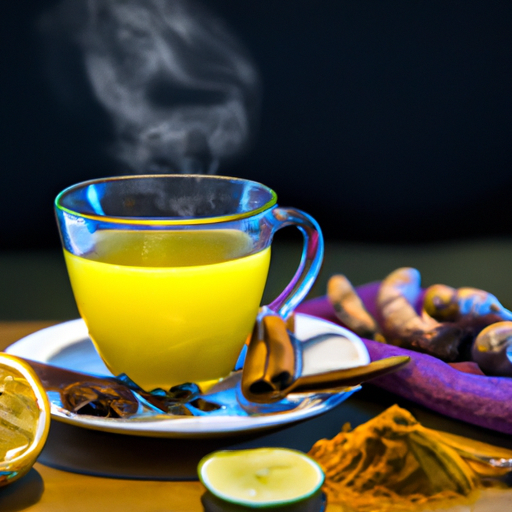Picture yourself strolling through a dense forest, enveloped by vibrant foliage and the delightful scent of blossoming flowers. While progressing on your path, you encounter a plant with vivid orange roots, known as turmeric.
For centuries, turmeric has been used for medicinal purposes in traditional medicine systems like Ayurveda and Chinese medicine. It has recently gained popularity in the western world for its numerous health benefits, and one way to consume it is by drinking turmeric tea.
Turmeric tea is not only a delicious and soothing beverage, but it is also packed with powerful antioxidants and anti-inflammatory properties that can help reduce inflammation, boost your immune system, and improve your overall well-being. This natural remedy has been used for centuries to treat a variety of ailments, from digestive problems to joint pain.
Whether you are looking to improve your health or just want a warm and comforting drink, turmeric tea may be worth adding to your daily routine. So, can turmeric be taken as tea? The answer is a resounding yes, and in this article, we will explore the science behind turmeric tea, its potential health benefits, and how to make it at home.
Key Takeaways
- Turmeric tea can provide numerous health benefits, including reducing inflammation, improving immunity, and aiding digestion.
- To make turmeric tea, boil water, add grated or powdered turmeric, and allow to steep for at least 10-15 minutes before adding honey, lemon, or ginger to taste.
- Turmeric supplements are available in capsules, powders, and liquids and may contain a higher concentration of curcumin.
- It’s important to choose fresh, high-quality turmeric and not consume more than 1-2 teaspoons per day. It’s also recommended to speak with a healthcare provider before adding turmeric tea or supplements to one’s daily routine, especially if taking certain medications.
What is Turmeric and Its Health Benefits
You’ll be pleased to know that turmeric isn’t just a tasty spice, but it also has numerous health benefits when added to your diet! Turmeric has been used for centuries in traditional medicine systems, such as Ayurveda and Chinese medicine, to treat a variety of ailments.
Turmeric contains curcumin, a powerful antioxidant and anti-inflammatory compound that has been shown to improve brain function, lower the risk of heart disease, and even potentially prevent cancer.
If you’re interested in incorporating turmeric into your diet, there are plenty of delicious turmeric recipes to choose from. You can add turmeric to soups, stews, and curries, or even make a turmeric latte.
When it comes to turmeric dosage, it’s important to remember that more is not necessarily better. It’s recommended to consume no more than 1-2 teaspoons of turmeric per day.
Now that you understand the health benefits of turmeric, let’s move on to understanding the science behind turmeric tea.
Understanding the Science Behind Turmeric Tea
Get ready to discover the fascinating science behind a warm and delicious beverage that’s been enjoyed for centuries. Turmeric tea is not only known for its rich golden color, but also for its unique flavor profile. The flavor of turmeric tea is described as earthy and slightly bitter, with a hint of sweetness and spice. This is due to the presence of curcumin, the active ingredient in turmeric that gives it its distinctive flavor and health benefits.
When it comes to brewing techniques, there are a few things to keep in mind. First, it’s important to use fresh, high-quality turmeric root or powder. Second, make sure to add black pepper or a source of fat like coconut milk to enhance the absorption of curcumin. Finally, allow the tea to steep for at least 10-15 minutes to fully extract all the beneficial compounds.
By following these simple steps, you can enjoy a cup of turmeric tea that not only tastes great but also provides a range of potential health benefits.
Potential Health Benefits of Turmeric Tea
If you’re looking for a natural way to boost your overall health, consider adding turmeric tea to your daily routine.
With its anti-inflammatory properties, turmeric tea can help reduce inflammation throughout your body, which can alleviate symptoms of conditions like arthritis and other chronic illnesses.
Additionally, the antioxidant effects of turmeric tea can help protect your cells from damage caused by free radicals.
Its gut health benefits can improve digestion and reduce bloating.
Anti-Inflammatory Properties
Turmeric has anti-inflammatory properties that are like a soothing balm for the body, making it a great addition to your daily tea routine. Drinking turmeric tea regularly can help manage pain and inflammation in the body, making it particularly helpful for those with arthritis.
Turmeric tea is also a natural way to support the body’s healing processes. It helps to reduce inflammation without the negative side effects that come with many over-the-counter pain medications. In addition to its anti-inflammatory effects, turmeric tea is known for its antioxidant properties.
Antioxidants are essential for protecting the body from damage caused by free radicals, which can contribute to chronic disease and aging. By incorporating turmeric tea into your daily routine, you can support your body in its fight against oxidative stress and promote overall health and longevity.
Antioxidant Effects
You’ll love how incorporating this powerful root into your daily routine can help fight against oxidative stress and promote overall health and longevity. Turmeric has potent antioxidant properties that researchers have extensively studied. Antioxidants are essential in preventing cellular damage caused by free radicals, which are unstable molecules that can harm your body’s cells and DNA.
Turmeric’s antioxidant research has shown that it can neutralize free radicals and reduce inflammation, both of which are crucial for maintaining good health. Culinary applications of turmeric, such as turmeric tea, are an easy way to incorporate this potent root into your diet. Try adding a teaspoon of turmeric powder to a cup of boiling water, along with a pinch of black pepper and honey to taste.
Turmeric’s antioxidant effects make it a great addition to any natural healing regime. Its ability to reduce inflammation and ward off cellular damage can help prevent chronic diseases and support overall wellbeing. When combined with other gut-healthy foods, turmeric can work wonders for your digestive system.
Gut Health Benefits
Wow, your gut will be thanking you with all the amazing benefits you’ll experience from incorporating turmeric tea into your daily routine. Not only does it have powerful antioxidant effects, but it also has incredible gut health benefits. Turmeric tea can be incredibly helpful for those looking to lose weight, as it aids in digestion and can help regulate metabolism.
In fact, turmeric tea has been used for centuries in traditional medicine systems for its digestive properties. It can help alleviate symptoms of bloating, gas, and indigestion. Take a look at the table below to see some of the specific ways that turmeric tea can benefit your gut health. As you can see, drinking turmeric tea can have a wide range of positive effects on your digestive system. However, it is important to take precautions when drinking turmeric tea, which we will discuss in the next section.
Precautions to Take While Drinking Turmeric Tea
Before you start sipping on that delicious turmeric tea, make sure to take some precautions to ensure that you’re getting the most out of its health benefits.
While turmeric tea has numerous benefits, including reducing inflammation and improving gut health, it’s important to note that it may interact with certain medications. If you’re currently taking any medications, it’s best to speak with your healthcare provider before adding turmeric tea to your daily routine.
Another precaution to take while drinking turmeric tea is to not exceed the recommended daily dosage. While turmeric is generally safe, consuming too much of it can lead to side effects such as nausea, dizziness, and diarrhea. It’s recommended to not exceed 1-2 teaspoons of turmeric powder per day.
By taking these precautions, you can enjoy the benefits of turmeric tea without any adverse effects.
Now, let’s move on to how to make turmeric tea.
How to Make Turmeric Tea
Get ready to spice up your day with a warm and comforting cup of this golden elixir that’ll make your taste buds dance with joy! Turmeric tea is a delicious and nutritious way to incorporate more of this potent spice into your diet. Here’s how to make it:
Start by boiling 2 cups of water in a small pot.
Add 1 teaspoon of grated or powdered turmeric to the water and let it simmer for 10 minutes.
After 10 minutes, turn off the heat and let the tea cool for a few minutes.
Strain the tea into a cup and add honey, lemon, or ginger to taste.
There are many variations of turmeric tea that you can try, such as adding cinnamon, black pepper, or milk.
Drinking turmeric tea regularly can provide a multitude of health benefits, including reducing inflammation, boosting immunity, and improving digestion. So why not incorporate this powerful spice into your daily routine?
To learn other ways to incorporate turmeric into your diet, keep reading.
Other Ways to Incorporate Turmeric into Your Diet
You can easily add a pinch of this powerful spice to your favorite meals, like roasted vegetables or scrambled eggs, for added flavor and health benefits. But if you’re looking for more creative ways to incorporate turmeric into your diet, there are plenty of delicious recipes out there to try. One popular option is golden milk, a warm and soothing beverage made with turmeric, milk, and other spices like cinnamon and ginger. Another tasty idea is to use turmeric in your smoothies, blending it with ingredients like banana, mango, and coconut milk for a tropical twist.
To give you some inspiration, here’s a table with three tasty turmeric recipes to try:
| Recipe | Ingredients | Instructions |
|---|---|---|
| Turmeric Latte | 1 cup milk, 1 tsp turmeric, 1 tsp honey, 1/2 tsp cinnamon | Heat the milk in a small saucepan over medium heat. Add the turmeric, honey, and cinnamon and whisk until well combined. Pour into a mug and enjoy! |
| Turmeric Roasted Cauliflower | 1 head cauliflower, 2 tbsp olive oil, 1 tsp turmeric, salt and pepper | Preheat the oven to 425°F. Cut the cauliflower into bite-sized florets and place on a baking sheet. Drizzle with olive oil and sprinkle with turmeric, salt, and pepper. Roast for 20-25 minutes, or until golden brown and tender. |
| Turmeric Ginger Tea | 2 cups water, 1 inch fresh ginger, sliced, 1 tsp turmeric, honey to taste | Bring the water to a boil in a small saucepan. Add the ginger and turmeric and simmer for 10 minutes. Strain the mixture into a mug and add honey to taste. |
While incorporating turmeric into your diet through food is a great option, you may also consider taking turmeric supplements for a more concentrated dose of its beneficial compounds. In the next section, we’ll explore the differences between turmeric supplements and turmeric tea.
Turmeric Supplements vs. Turmeric Tea
If you’re looking for a more concentrated dose of turmeric’s powerful compounds, supplements may be the way to go. These supplements are available in capsules, powders, and liquids, and may contain a higher concentration of curcumin, the active ingredient in turmeric.
However, don’t overlook the soothing and comforting benefits of a warm, spicy tea that can warm your soul. Turmeric tea is a popular culinary use of turmeric, and it’s a natural and delicious way to incorporate this spice into your diet.
Turmeric supplements can provide a more potent dose of turmeric, but turmeric tea has been used for centuries in traditional medicine systems for its anti-inflammatory and antioxidant properties. Additionally, turmeric tea is easy to make at home and can be customized to your taste preferences.
It’s important to note that while turmeric supplements and tea can both provide health benefits, they shouldn’t be used as a substitute for medical treatment.
Now that you know the benefits of turmeric supplements and tea, let’s discuss choosing the right type of turmeric for your needs.
Choosing the Right Type of Turmeric
When it comes to incorporating the benefits of this powerful spice into your diet, it’s important to know the different types of turmeric available and which one is best suited for your needs.
There are three main varieties of turmeric: fresh, dried, and powdered. Fresh turmeric root can be found in some specialty grocery stores and can be used in cooking and juicing. Dried turmeric is often used in spice blends and can be found in most grocery stores. Powdered turmeric is the most common form and is used in many recipes and supplements.
Once you have chosen the right type of turmeric, it’s important to know the best brewing method for making tea. The most common method is to simmer turmeric in water for 10-15 minutes and then strain. You can also add other ingredients like ginger, honey, and lemon to enhance the flavor and health benefits.
Another option is to use a turmeric tea bag, which is convenient and easy to use. Whichever method you choose, incorporating turmeric tea into your daily routine is a great way to reap the many health benefits of this powerful spice.
Frequently Asked Questions
Can turmeric tea be consumed during pregnancy?
You can safely consume turmeric tea during pregnancy, as it has numerous health benefits for both mother and baby. It helps with inflammation, digestion, and can even improve skin health. Traditional medicine systems have long used turmeric for its healing properties.
How much turmeric tea is safe to consume in a day?
To reap the benefits of turmeric tea, consume no more than 1-2 cups per day. A simple recipe is boiling 1 tsp of grated fresh turmeric in 2 cups of water for 10 minutes. Turmeric has been used for centuries in traditional medicine systems for its anti-inflammatory and antioxidant properties.
Does turmeric tea have any side effects?
When consumed in moderation, turmeric tea can offer numerous health benefits such as reduced inflammation and improved digestion. However, excessive intake can cause side effects such as stomach upset and thinning of the blood. To make it at home, boil water with turmeric powder and ginger.
Can turmeric tea be consumed on an empty stomach?
Imagine starting your day with a warm, soothing cup of turmeric tea. It’s a great way to kickstart your digestion and metabolism. Turmeric tea benefits include boosting immunity and reducing inflammation. Choose from various turmeric tea recipe options to suit your taste.
Is turmeric tea effective in treating specific health conditions?
Looking to improve your health naturally? Turmeric tea benefits include reducing inflammation, aiding digestion, and improving brain function. Recipes include adding ginger, honey, or lemon to enhance flavor and boost wellness. Try it out and feel the difference.
Conclusion
Congratulations, you’re now equipped with the knowledge to make turmeric tea a part of your daily routine and reap the potential health benefits it offers.
As you sip on this warm and comforting beverage, remember that you’re not only enjoying its delicious flavor, but also nourishing your body with its anti-inflammatory and antioxidant properties.
Remember, prevention’s always better than cure. By incorporating natural remedies like turmeric tea into your diet, you’re taking a holistic approach to healing and promoting overall wellness.
As the saying goes, "an ounce of prevention is worth a pound of cure". So, why not start sipping on some turmeric tea today and give your body the boost it needs to stay healthy and strong!










